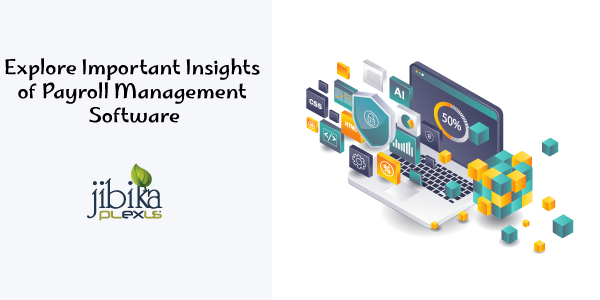From small to large businesses, a payroll management system is an essential tool that every company tends to own. Though there is a misconception that a payroll software is used for calculating the paychecks, it is actually a complete solution for easing the HR tasks and track the company growth overall. A company has to deal with continuous changes in regulations and tax laws. And, with a manual payroll system, it’s not only a time consuming job but also increases the risk of making errors.
So, if you want to streamline the payroll processes, boost up accuracy and compliance with the changing regulations, then it’s important for you to find the best HR and payroll software. With the right software you can automatically track hours, attendance, leave, taxes, benefits and generate reports in no time with precise calculation. If you are still undecided about availing HR and payroll software, then this article is just for you.
Here, you will learn about HR payroll software, its types, how they work, and the important insights of payroll management software so that you can ensure your business’s operational efficiency.
What Is Payroll Management Software for Hr, and How Does It Work?
You already have a brief idea about payroll management software. To elaborate, it’s a cloud-based program created to ensure an easy payroll procedure. Using this software, you can log shifts, record employees’ daily attendance, leave, earned leave, and benefits, and conclude all the data with financial transactions.
Here, if your company offers a provident fund, tax payments, transport allowance, medical leave, and any other required deductions, the software will optimize those data and find the net payment an employee should receive. You just need to input the data, and the software will do the rest of the calculation with accuracy and precision. Companies tend to optimize the payroll process on a monthly basis.
The purpose of using the hr payroll system is to assist the HR department in doing time-consuming and repetitive tasks so that they can utilize their efficiency and time on more productive tasks such as planning, creating budgets, initiatives for company growth, motivating the employees, and so on.
Payroll systems have been so advanced that you can now access this system across the departments, including HR, finance, and technical teams, to operate the corporate streamline seamlessly. Without a doubt, payroll services have become more advanced and easy to access, ensuring their efficiency and competence in businesses.
There are four main types of payroll systems available, and they vary according to company requirements. There are differences in features, accessibility, processing methods, price and many more.
In-house Payroll
An in-house payroll system is designed for companies where the software will be used by a group of employees within the organization. These kinds of systems are available at a reasonable price, pose a minimal security risk, and are simple and pretty straightforward for anyone to use. So, if you are looking for a suitable payroll system for a small company, then an in-house system would be an appropriate choice.
Cloud-based Payroll System
Cloud-based payroll software is a web-based portal which you can access online. They are basically automated tools where you can insert data and access everything in the cloud. Some of the benefits of cloud-based payroll systems that make them remarkable are the automated reporting features, the fact that no additional software is required, and the easy integration with account-related software.
Professionally Managed Payroll System
Generally, Certified Public Accountants (CPA) or professional bookkeepers use the professionally managed payroll system. Since it’s used by experts, the features are extensive and require special skill sets to operate the software. The benefit of having this software is you do not need much intervention for small and simple tasks. You can also customize the features according to your business requirements. Thus, it is more suitable for medium to large organizations.
Agency-based Payroll Service
Some companies prefer to hire external payroll services. For them, an agency-based payroll system is available. Here, the hired company will handle all the payroll-related obligations such as tax, wages, deductions and so on. If you have a small HR team and don’t want to delay any payments, then the agency will accelerate the process with accuracy.
Important Insights of Payroll Management Software
Payroll management software is not limited to HR department jobs only. It is widely known that the software saves time, minimizes errors, streamlines the workforce, and ensures security and integration. However, the sphere is much broader than you can think of. In fact, the system has been so advanced and ever-evolving that it has been an inseparable part of any organization, regardless of how small or large the company is. To understand the efficiency of the payroll system, here are some significant insights presented for you.
Accuracy in Payments
One of the most valuable aspects of a payroll system is its accuracy. The system ensures that employees receive an accurate paycheck and calculates their wages while deducting PF, taxes, leaves, transport allowance, and other adjustments.
Compliance with Tax Regulation
The tax rules and regulations keep changing which is often difficult to navigate for the HR team. The payroll software makes it easy and accurate. Since the software is automated, you can easily update the software and get accurate data every time.
Comprehensive Report
Companies require an overall report of all the employees integrating the business performance. The payroll software also facilitates that matter. A competent payroll system can generate monthly, quarterly or even yearly reports providing detailed insights on expenses, employee performance, and compliance status. This report also helps to create a new business strategy for further growth of the company.
Data Security and Confidentiality
A payroll system contains individual data, which is very sensitive. Hence, it’s important to ensure data security, which is possible with a reliable payroll system. You will be amazed to know that an advanced payroll system incorporates extensive quality security features in various layers which will protect every single data from hacking or unauthorized access.
Financial Integrity
A reliable payroll system not only eases organizational tasks but also ensures integrity in various departments. Ensuring accuracy in data collection, calculation and accuracy in payments, the financial system also becomes strong. It establishes transparency and helps maintain an accountable financial system.
Employee Engagement, Motivation and Satisfaction
Employees are bound to submit their tasks on time. Hence, they also expect and deserve on time payment from the company as well. So, with payroll software, the calculation is done automatically which accelerates the payment process as well.
Thus, as they receive their earned payment timely, it also ensures the reliability of the company, creating strong relationships with the managers. Nevertheless, as the employees can also visualize their overall performance report, it positively impacts their morale and brings the urge to perform better every time.
What Are the Must-have Features to Find the Right Payroll Management Software for Your Company?
With the growing popularity, there is a large number of payroll systems available out there. It’s a challenge to find the right and most reliable one. Here is a list of key features that will help you choose the one you need for your company.
- Consider the number of employees of your company, expected growth and budget before purchasing the payroll software.
- Think about the complexity of your company’s payroll process and choose a competent payroll system accordingly.
- Check if the payroll system has the following features: tax deduction, automated calculation, self-service portal, and time and attendance integration.
- Consider checking user friendliness and data security with the highest priority.
Final Thought
Payroll management software is an ever-evolving revolutionary creation. As time passes, new features will be added to make our office tasks easy, fast and seamless. The important insights of payroll software represent a glimpse of what is coming in future.







